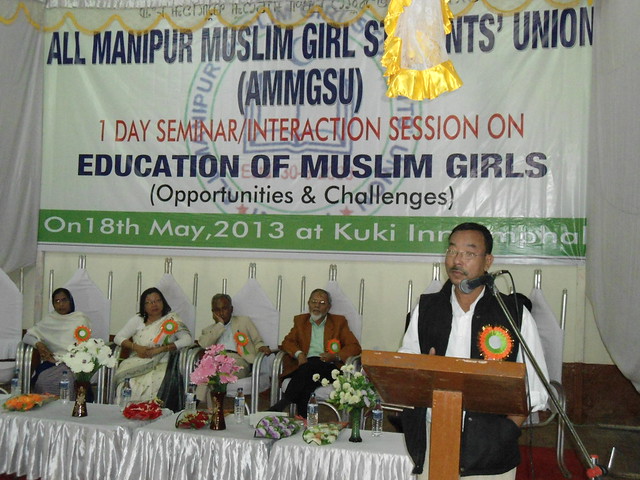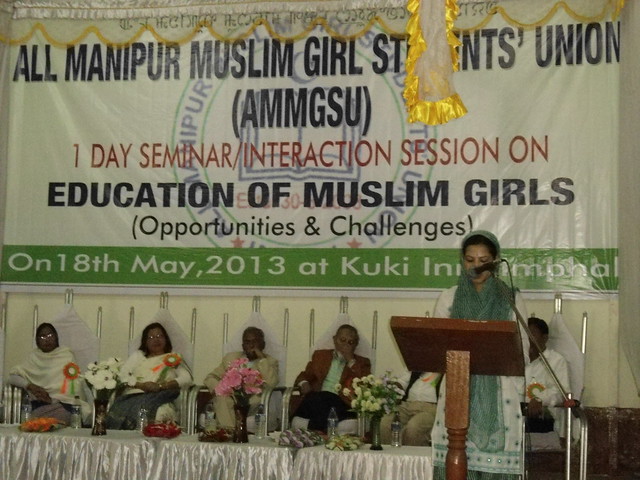By Dr. Syed Ahmed, for TwoCircles.net,
Imphal: All Manipur Muslim Girl Students’ Union (AMMGSU) organized a one-day seminar cum interaction session on the theme “Education of Muslim Girls: Opportunities and Challenges” at Kuki Inn at Imphal on 18 May 2013.
The seminar was attended by former Speaker of Manipur State Assembly Dr. Md. Maneruddin Sheikh, Social Worker Okram Henry, Social Activist Dr. Dhanabir Laishram, A.R. Khan, IAS (Retd.), State Nodal Officer of National Tobacco Control Programme Dr. Konsam Kamolini Devi, Assistant News Editor of Dordarshan, Imphal Ch. Birendra Singh and Social Worker Sitara Begum.

Dr. Dhanabir Laishram speaking
In the key-note address, President of AMMGSU Rukshar Chowdhury presented a concise report of the survey conducted by the union in some of the Muslim inhabited areas of the State to understand the problems faced by the Muslim girls in getting modern education. She said, “From the survey we came to know that majority of the Muslim girl students in the State could not complete school education due to various socio-economic and cultural factors. Besides these, the State Government has failed to give adequate attention to promote the education of Muslim girls.”
Chowdhury further said, “It was seen that the infrastructure of the Government schools in the Muslim concentrated areas are in deplorable condition. Most of the schools do not have the basic requirements, like sufficient number of class-rooms, toilets, drinking water facilities, teaching-learning materials, etc. As a result these schools fail to attract the students. Very few Muslim girls could complete school education in the State. The enrolment of Muslim girls in colleges is extremely low. The number is further reduced at the university level. We were informed that Muslim girls often fail to get admission in good colleges due to the tough admission procedures. At present there are only 12 Muslim girls studying in Manipur University. We came to know that in the rural areas the engagement of Muslim girls in domestic chores by their parents, tradition of early marriage, distance of schools, specially secondary schools, are some of the main hurdles in completing their school education. However, poor economic condition of majority of the Muslims in the State remains the main reason for the low educational attainment of Muslim girls in the State.”
“After the survey the union had decided to place some proposals to improve the education of Muslim girls to the State Government. We have organized the seminar to draw some recommendations,” she added.
The seminar session was inaugurated by Dr. Maneruddin Sheikh. Dr. Dhanabir Laishram and Assistant Professor of Lilong Haoreibi College Dr. Syed Ahmed (the author of this report) presented papers on the theme of the seminar.
The paper presented by Dr. Dhanabir Laishram focused on the declining value based education system in the state. “Our education system does not have moral and ethical values. Parents want their children to bring good marks in the exams. As a result we have created an exam-based education system. Tuition becomes a part of our education system. All these give immense pressure and stress to the children. As a result we have created corrupt and immoral citizens. It is time that we know the real meaning of education. Our children need counseling,” the paper mentioned.
The paper presented by Dr. Syed Ahmed stated the findings of the some of studies done in the State and at the All-India level to assess the low level of education of Muslim girls. The paper stated, “The report on the socio-economic condition of the Muslims in Manipur, released in 2004, has shown high enrolment of Muslim girls at the elementary stage, however majority of these girls dropping out at the secondary level. In fact, the recent survey of National Commission for Minority Educational Institutions (NCMEI) had also found similar trend at the all-India level too. The report had stated that Muslim girls stop showing up in class when they turn 14. The report further made the shocking revelation that in 1947, 8.5% of Muslim women attended college, compared to just 2.4% today. The Muslim women were way ahead of Hindu counterparts at the time of partition. According to the 2001 Census, one in 101 Muslim women is a graduate, whereas one out of 37 women in the general population is a graduate. The report of NCMEI has also shown that low level of education of Muslim girls is not due to religion but to poor economic condition of the Muslims. Just 16% of Muslim girls from poor families attend schools, while 70% of Muslim girls from well-off families.”
The paper also cited some of the reasons which compelled the Muslim girls in the State to drop out as they reach secondary level. It notes, “In the rural areas of Manipur the Muslim girls could not complete school education as their parents do not have enough resource to fund their education. The girls are also often engaged in household works, including agricultural activities. Moreover, Muslim parents give less importance in educating their girls. They give more preference to education of their boys. The tradition of early marriage further hinders the education of girls. Added to all these, the Government schools in the rural areas of Manipur fail to give quality education. The schools are in deplorable condition devoid of all the basic infrastructures. The poor rural Muslim parents could not afford the private schools. Furthermore, the illiterate Muslims in the remote areas are not aware of the scholarship schemes and other incentives that the Government provides for the students.”

President of AMMGSU Rukshar Chowdhury speaking
The paper also gave few recommendations to improve the education of Muslim girls. “The State Government should commission the Department of Minority and Other Backward Classes (MOBC) to conduct surveys to identify the problem areas in the education of Muslims in the State. Besides improving the infrastructure of schools in Muslim inhabited areas, the State Government should also plan to establish Kendriya Vidyalayas and Model schools in the large Muslim concentrated areas and Kasturba Gandhi Balika Bidyalayas in the remote Muslim inhabited areas of the State to give quality education to the Muslim students. Minority cells, with advisory committees, should be created in the Department of School Education as well as in the Department of Higher Education to cater the needs of the Muslim students efficiently. Admission procedures in the colleges and universities should be relaxed for the Muslim students. Hostels facilities should be made available in the campus of some of the premier colleges of the State for the Muslim girls from remote areas. The Muslims in the remote areas should be properly informed about the scholarship schemes and other incentives like free textbooks, uniforms, educational bank loans through awareness programmes,” the paper noted.
“As poverty is the most important factor for the low level of education of Muslim girls the State Government should evolve strategies to improve the economic condition of the Muslims in the State through poverty alleviation programmes,” the paper further added.
The paper presentation was followed by an interactive session, which was participated by members of civil society organizations, academicians, Government officials, community leaders and students. Observations, recommendations and suggestions were further shared by the participants in the course of the interaction. Some of the recommendations worth mentioning are: monitoring of the Government schools in the Muslim areas, preparation of a comprehensive educational plan for improving the educational standard of the Muslims with adequate funds by the State Government, establishing schools and colleges exclusively for Muslim girls in large Muslim inhabited areas, institution of skill development centres for Muslim women, implementation of livelihood mission for improving the economy of the Muslims in the State, etc.
In the concluding speech, A.R. Khan said the Union will prepare a memorandum taking into account all these recommendations and suggestions. The memorandum will be soon submitted to the Chief Minister Okram Ibobi Singh, who also looks after Department of MOBC & SC, and Education Minister M. Okendro Singh, among others, for implementation, Khan added.

